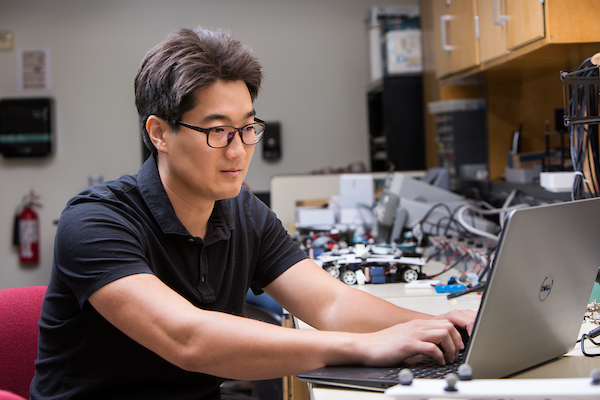Master of Science - Computer Science
The Master of Science in Computer Science (MSCS) is a research degree. A thesis and final examination (thesis defense) are required. The final exam is a requirement to earn the thesis degree, it is not entitled to a waiver. Students who complete the MSCS degree may file a letter of intent requesting admission to the Ph.D. program. This is a STEM program.
I'm ready to apply! Request Information

Overview
-
Advisory Committee
The student must select an advisory committee chair from the department’s graduate faculty. If a student wishes to have a chair who does not have an appointment with the department, then the committee must have two co-chairs, including one who is a member of the department’s graduate faculty (a committee has either one chair or two co-chairs).
The chair and the student work together to select the remainder of the advisory committee. The advisory committee for the MSCS degree consists of at least three members from the Texas A&M graduate faculty (the chair counts as a member). There must be at least one member from another department, and there must be a majority from the department. Note that all faculty members with full joint appointments in the department will be considered as departmental faculty when evaluating the composition of the committee. Faculty who hold courtesy appointments will count as outside members of the committee. The graduate advising office can provide information on which faculty hold joint appointments.
The advisory committee can have supplemental members who are not members of the Texas A&M graduate faculty (and hence do not count when evaluating the composition of the committee). Supplemental members are usually added because they have some special expertise that is relevant to the student’s research topic. Such members are added by “special appointment” requests. Check with the graduate advising office for more information.
After the student and chair agree on a tentative advisory committee, the student will then meet with each prospective committee member to determine whether this committee assignment is agreeable and then file a degree plan.
Degree Plan
The degree plan should be completed by the student in consultation with the chair and the advisory committee. Requirements for the MSCS degree include:
- At least 18 credit hours of graded computer science and engineering (CSCE) graduate coursework (excluding CSCE 681, 684, 685, 691).
- Three breadth CSCE courses, one selected from each of these sets: Theory (627, 629), Systems (605, 611, 613, 614 and 678) and Software (604, 606, 634, 655, 656, 670, 671, 672 and 713). These must be passed with a grade of B or better. These count toward the requirement of 18 hours of graded CSCE graduate coursework.
- At most one three-credit 400–level CSCE undergraduate course approved by the graduate advisor. This course does NOT count towards the 18 hours of CSCE-graded graduate coursework.
- At most six credit hours of non-CSCE graded graduate coursework (excluding 681, 684, 685 and 691).
- One credit hour of CSCE 681 (Graduate Seminar).
- Three to six credit hours of CSCE 691 (Research).
- Up to three credit hours of CSCE 685 (Directed Studies). The combination of 685 and 691 cannot exceed seven credit hours.
- A total of at least 30 credit hours.
Courses That Cannot Be Used on Any Degree Plan
- In CSCE, we do not allow 601, 602, 603, 701, 705, 706, 707, 708 and 709.
- In ECEN, we do not allow 714 and 749.
- In STAT, we do not allow 624 and 654.
- In MATH, we do not allow 679.
- In CYBR, we do not allow 601.
- In ISTM, we do not allow 601.
- Any course that contains material required of our undergraduate computer science (CPSC) or computer engineering majors.
- CSCE undergraduate courses 481, 482, and 483.
Other Degree Plan Information
- If you took CSCE 410 while a Texas A&M undergraduate and received an A you meet the breadth Systems requirements. You will not list the course on the graduate degree plan. Instead, take an additional CSCE graded graduate course. You should not take CSCE 611.
- If you took CSCE 411 while a Texas A&M undergraduate and received an A you meet the breadth Theory requirements. You will not list the course on the graduate degree plan. Instead, take an additional CSCE graded graduate course. You should not take CSCE 629.
- If you took CSCE 420 while a Texas A&M undergraduate and received a B or better, you should not take CSCE 625. Instead, take an additional prescribed elective class.
- If you took CSCE 421 while a Texas A&M undergraduate and received a B or better, you should not take CSCE 633. Instead, take an additional prescribed elective class.
- If you took CSCE 431 while a Texas A&M undergraduate and received an A you meet the breadth Software requirements. You will not list the course on the graduate degree plan. Instead, take an additional CSCE graded graduate course. You should not take CSCE 606.
- For stacked courses: If you have credit for an undergraduate class, you cannot get credit for the graduate class, except via Fast Track.
-
Stacked courses
When a graduate and undergraduate course is stacked, graduate students must take the graduate course in the stacked pair. If there are seats in the undergraduate section but not in the graduate section, you should contact the graduate advising office to request that a seat be reallocated. Reallocation can be requested but will have to be approved. Not all reallocations may be approved.
- The common stacked pairs are:
- 402/702 (always stacked)
- 410/611 (sometimes stacked)
- 411/629 (sometimes stacked)
- 413/713 (always stacked)
- 421/633 (sometimes stacked)
- 432/632 (always stacked)
- 433/627 (always stacked)
- 434/605 (always stacked)
- 435/735 (always stacked)
- 439/704 (mostly stacked)
- 440/640 (sometimes stacked)
- 445/656 (always stacked)
- 447/679 (sometimes stacked)
- 448/748 (always stacked)
- 449/749 (sometimes stacked)
- 451/652 (always stacked)
- 452/752 (always stacked)
- 463/612 (always stacked)
- 469/614 (sometimes stacked)
- 477/703 (always stacked)
- Texas A&M undergraduates can receive credit for both courses in an undergrad/grad course pair under Fast Track.
- Prerequisites listed for CSE graduate coursework are given to inform you of the knowledge you are expected to have to be successful in the graduate course. While our department does not block registration based on prerequisites for graduate courses, you are still responsible for ensuring you are prepared to meet course prerequisites. If you have concerns regarding preparation for a particular class, you should contact the graduate course instructor for more information regarding expectations.
CSCE 684 Hours
- Any international student who wishes to go on curricular practical training must have one credit hour for each semester they are on the internship of CSCE 684 on their degree plan. Any CSCE 684 hours are in addition to the required total credit hours of the degree plan.
- If you are an international student, we recommend you place at least one credit hour of CSCE 684 on your degree plan when you submit it. This way, if you receive an internship offer, you will not be rushing to have 684 added to your degree plan.
- Domestic students do not need to register when they are on an internship. However, if they are gone for a year without registering, they must apply for a leave of absence. Otherwise, they will need to reapply for admission.
For additional information and clarification, please see the graduate catalog and the department’s graduate program webpage.
- The common stacked pairs are:
